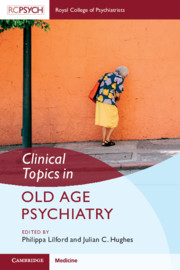Book contents
- Clinical Topics in Old Age Psychiatry
- ‘Clinical Topics In … ’
- Clinical Topics in Old Age Psychiatry
- Copyright page
- Dedication
- Contents
- Contributors
- Preface
- Acknowledgement
- Editors’ Note
- Abbreviations
- Introductory Comments
- Section 1 Epidemiology and Types of Disorders
- Section 2 Assessment and Investigations
- Section 3 Approaches to Management
- Chapter 14 Supporting Self-Management in Early Dementia
- Chapter 15 What Can Person-Centred Care in Dementia Learn from the Recovery Movement?
- Chapter 16 Psychosocial Interventions in Dementia
- Chapter 17 Palliative Care in Dementia
- Chapter 18 Review of Treatment for Late-Life Depression
- Chapter 19 Reducing the Healthcare Burden of Delirium
- Chapter 20 Controlling the Confusion
- Section 4 Law, Ethics, and Philosophy
- Index
- References
Chapter 15 - What Can Person-Centred Care in Dementia Learn from the Recovery Movement?
from Section 3 - Approaches to Management
Published online by Cambridge University Press: 12 September 2020
- Clinical Topics in Old Age Psychiatry
- ‘Clinical Topics In … ’
- Clinical Topics in Old Age Psychiatry
- Copyright page
- Dedication
- Contents
- Contributors
- Preface
- Acknowledgement
- Editors’ Note
- Abbreviations
- Introductory Comments
- Section 1 Epidemiology and Types of Disorders
- Section 2 Assessment and Investigations
- Section 3 Approaches to Management
- Chapter 14 Supporting Self-Management in Early Dementia
- Chapter 15 What Can Person-Centred Care in Dementia Learn from the Recovery Movement?
- Chapter 16 Psychosocial Interventions in Dementia
- Chapter 17 Palliative Care in Dementia
- Chapter 18 Review of Treatment for Late-Life Depression
- Chapter 19 Reducing the Healthcare Burden of Delirium
- Chapter 20 Controlling the Confusion
- Section 4 Law, Ethics, and Philosophy
- Index
- References
Summary
This chapter explores the concept of ‘recovery’ and its applicability to older people with mental health problems and specifically those with dementia. A previous paper noted the complementarity, shared values and convergent evolution of recovery-focused and person-centred approaches in adult and older adult care and the considerable opportunity to learn from one another. This chapter revisits the development, similarities and differences in these values-led approaches and the further developments that have arisen in the last 10 years. We propose that there continues to be a fertile and mutually supportive opportunity to share inspiration and practice. Some readers may be very familiar with this emphasis and the approach we outline and feel we are ‘stating the obvious’ concerning practice that is already established. We wish this were the case, but when we look beyond assent to theory, seeking well-established practice and positive outcomes, we note these philosophies still have a good way to go before they are enshrined as common practice and universally available to those who need them.
- Type
- Chapter
- Information
- Clinical Topics in Old Age Psychiatry , pp. 202 - 212Publisher: Cambridge University PressPrint publication year: 2020



